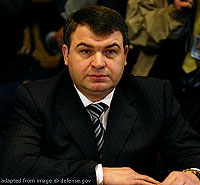The first big name falls in Russia’s anti-graft drive

(Business New Europe – bne.eu – November 7, 2012) On November 6, President Vladimir Putin sacked Russian Defence Minister Anatoly Serdyukov, who is accused of stealing $95m. We have been waiting for this. It’s the first time the Kremlin’s revitalized anti-corruption drive has reached into the inner circle.
The sacking appears significant and already has the international press asking if this is the start of a serious effort to crack down on corruption.
In fact, the Kremlin has been serious about corruption since Dmitry Medvedev took over from Putin as president in 2007 and began sacking and jailing public servants in earnest. The trouble was all the figures caught out by the drive were small fry. That made it easy for commentators to dismiss the evidence.
The momentum has certainly been building slowly. Russia’s score on Transparency International’s Corruption Perceptions Index has fallen from a peak of 154 in 2008 to 143 this year. Probably more telling, however, are reports that the estimated cost of a bribe is up 33-fold over the same period. The rising risk of getting caught taking a backhander has pushed prices up.
And as bne reported at the start of this year, Putin is also playing his part. He started to institutionalise the anticorruption drive this spring after attacking corruption in the utilities sector at the end of 2010. This resulted in a ban on state-owned companies subcontracting third party companies where the ultimate beneficial owner is unknown (and usually the CEOs wife). Between 40% and 60% of contracts with these faceless companies were broken by the state-owned companies in the spring.
That was followed by the appointment of Boris Titov as ombudsman for business, who is possibility going to emerge as Russias Anti-corruption tsar. A vocal critic of the Kremlin during his time as head of a non-oil business lobbying group, Titov’s complaints are also seen as constructive, and he is close to Putin. In his new official role, Titov is about to be given some real powers, which he says he intends to use in a bid to reduce corruption.
Taking it up a notch
However, the sacking of Serdyukov ratchets the whole game up a notch, as he is the highest-ranking official ever to be accused of graft. The defence minister was ousted following an investigation into an alleged $95m fraud at his notoriously corrupt office and the very public announcement made on TV on the morning of November 6 was clearly designed to ripple out as far as possible.
Until now, the Kremlin’s strategy has been to fire a series of warning shots across the bows of bribe-takers, to get the message across that taking money is no longer acceptable; but it has stopped short of systematically investigating every branch of government. The Kremlin can’t go that far – corruption is so persuasive that government would simply collapse if the police arrested everyone who had taken a backhander.
Sergei Shoigu, Russia’s most popular politician after Putin himself, has been named as the replacement defence minister. Shoigu is no stranger to the army, serving as a general before becoming the emergency situations minister, and then governor of the Moscow Region (which is separate from the city administration) earlier this year.
At this stage it’s not entirely clear how much to read into the sacking of Serdyukov, who has held the post for the past five years. However, for those watching the anti-graft drive build, it was clear early on that, to be effective, someone from the elite would have to be hung out to dry if it was going to succeed. Serdyukov is the unlucky man selected to play that role.
There is also a practical aspect to this sacking: Putin has been pushing to massively increase military spending in order to modernise the armed forces, and clearly doesn’t want a big chunk of that cash siphoned off. The president’s open criticism of the utilities sector, which also preceded big increases in state investment, illustrated a similar concern.
All that remains to be seen is what, if any, punishment Serdyukov gets, or whether he even goes on trial. Given the Kremlin has taken an incremental approach to dealing with graft, it is entirely possible that Serdyukov will not be charged, let alone jailed. While this will bring down international condemnation for not being tough enough on “cronies”, that is not how the elite in Russia will see it. Rather, they will be profoundly shocked by the sacking and Serdyukov’s public humiliation. That’s likely the goal – it is now clear that no one is exempt from investigation.
